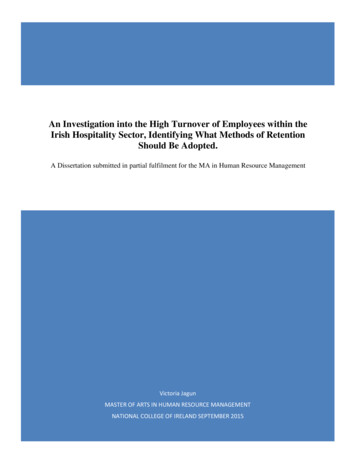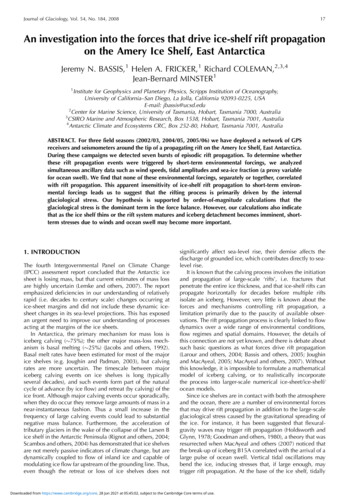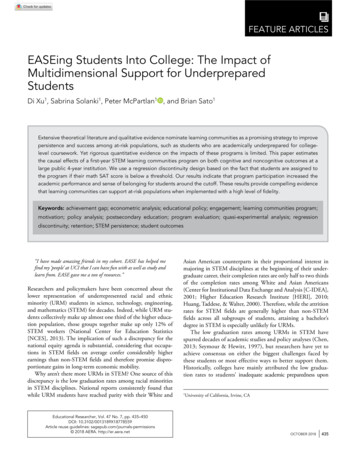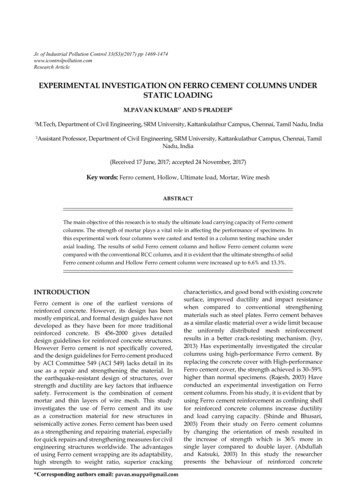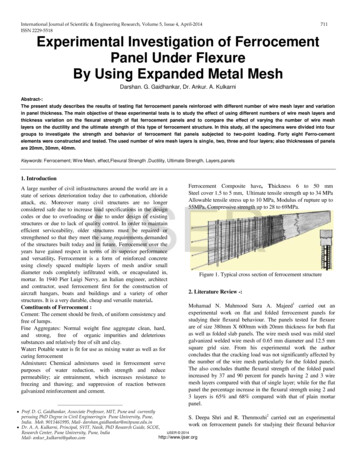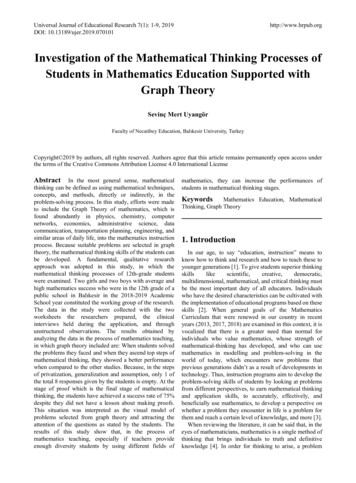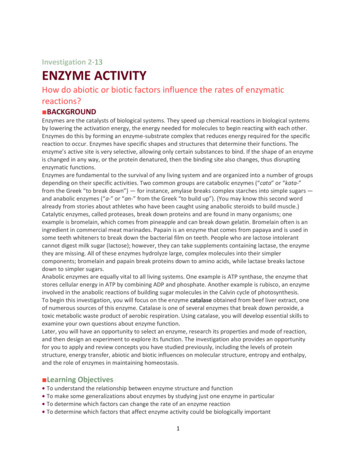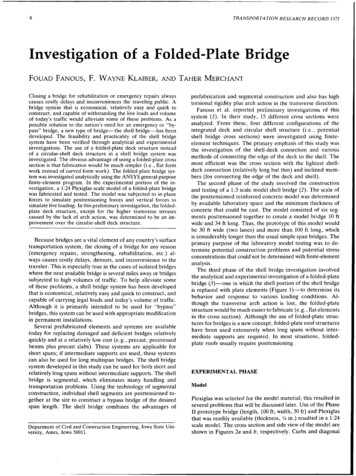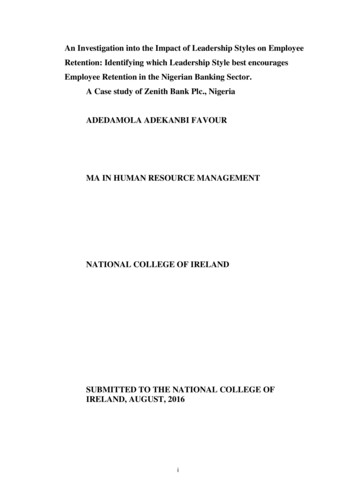
Transcription
An Investigation into the Impact of Leadership Styles on EmployeeRetention: Identifying which Leadership Style best encouragesEmployee Retention in the Nigerian Banking Sector.A Case study of Zenith Bank Plc., NigeriaADEDAMOLA ADEKANBI FAVOURMA IN HUMAN RESOURCE MANAGEMENTNATIONAL COLLEGE OF IRELANDSUBMITTED TO THE NATIONAL COLLEGE OFIRELAND, AUGUST, 2016i
AbstractAn Investigation into the Impact of Leadership Styles on Employee Retention:Identifying which Leadership Style best encourages Employee Retention in theNigerian Banking Sector. A Case study of Zenith Bank Plc, NigeriaAdedamola Adekanbi FavourEmployee retention is a major concern of the Nigerian banking sector today because ofincreased employee turnover. This can be said to be as a result of the series of banking reforms,mergers and acquisition of banks, loss of job commitment and low employee morale. TheNigerian banking sector is a strategic sector in the economy of the nation which drives thecountry’s economy; however, the challenges being faced in the banking sector will not onlyaffect the banks but can have an adverse effect on the economy of Nigeria if employee retentionstrategies are not put in place. This study was therefore designed to investigate the impact ofleadership style on employee retention in the Nigerian banking sector. More so, it was aimedat identifying the leadership style that best encourages employee retention in the Nigerian bank,with particular emphasis on the transformational and the transactional leadership styles. Theprimary data for this study was collected through questionnaires and analysed using theStatistical Package for Social sciences (SPSS). Data was collected through both open endedand close ended questions with a five point Likert scale. The study used the purposive, snowballand convenience sampling technique in order to get response from the respondents.The study revealed that leadership style has a moderate significance on employee retention andthat the transactional leadership style best encourages employee retention in the NigerianBanking sector. The study recommends that leaders and managers should properly implementthe exchange process of the transactional leadership style to mitigate employee turnover in theNigerian banking sectorii
DeclarationSubmission of thesis and dissertationNational College of IrelandResearch student declaration form(Thesis/author declaration form)Name: Adedamola AdekanbiStudent number: 15002667Award for which thesis is submitted: MA HRMSupervisor: Thomas McCabeMaterial submitted for award:a) I declare that the work has been composed by me.b) I declare that all verbatim extracts contained in the thesis have been distinguished byquotation marks and the sources of information have been specifically acknowledged.c) My thesis will be included in electronic format in the college institutional repositoryTRAP( thesis reports and projects)d) Either *I declare that no material contained in the thesis has been used in any othersubmission for academic award.Or *I declare that the following material in the thesis formed part of a submission forthe award of(State the awarding body)Signature of research student:Date:iii
AcknowledgementsI would like to thank God Almighty for helping me through this master’s study. I couldn’t havedone this without the Grace of God.I would like to say a very big thank you to my supervisor, Thomas McCabe for all his guidanceand advice towards the completion of this thesis.I would like to say a very big thank you to all the academic staff of National College of Irelandwho have helped and been supportive to me through this studies and I would like to speciallythank Keith Brittle for all his supports, guidance and assistance. You have always been thereto help me with my academic work. Thank you very much.I would like to thank everyone who took out time to participate in the survey for this study.Also I would like to say a very special thank you to my family, friends and classmates for theirsupports and encouragements particularly, Chika, Adeleke, Victoria, Sosa, Nonye, Arpita,Robinson, Wunmi, Dolapo, Bisi, Folake and Gbemisola. Thank you very much.Finally, I dedicate this thesis to my Parents, Mr and Mrs Bolaji. Thank you for all yourencouragements, constant supports and making this a reality for me. Thank you so much andGod bless you. Also to my siblings Dipo, Joseph, Obafemi, Ayo and Iyanu, thank you all foryour supports.iv
List of TablesTable 1-2: Scale Case Summary and Reliability 35Table 3-6: Scale case summary and reliability . . 36Table 7-8: Scale Summary and Reliability . 37Table 9: Gender Employee Retention Sample Size . 38Table 11: Employee retention Normality Result 39Table 12-13: Mann-Whitney Test and Grouping Variable: Gender .39Table 14: Age Employee retention sample size . 40Table 16: Age Employee retention Normality Result . 41Table 17-18: Kruskal-Wallis H test and Grouping Variable Age . 42Table 19: Marital Status Retention Sample . 42Table 21: Employee retention marital status Normality . 43Table 22-23: Mann-Whitney Test and Grouping Variable: Marital status 44Table 24-25: Pearson Correlation Results and Scatterplot . 45Table 27-28: Pearson Correlation Result and Scatterplot . 46Table 30-31: Pearson Correlation Result and Scatterplot . 47Table 33: Pearson Correlation Result . 48v
List of FiguresFigure 1-2: Employee Retention Gender Sample Distribution . 38Figure 3-4: Employee Retention Age Sample Distribution 40Figure 5: Employee Retention Age Sample Distribution 41Figure 6-7: Employee Retention Marital Status Sample Distribution . 43Figure 8: Other Factors Employee Retention Graph .74vi
Table of ContentsAbstract .iiDeclaration. iiiAcknowledgements . ivList of Tables . vList of Figures . viTable of Contents .viiSECTION ONE: INTRODUCTION. 11.0 Introduction . 11.1Research . 21.2 Research Objectives. . 21.3 Purpose of the Study . 31.4 Research Structure . 31.5 Background of the Nigerian Banking industry . 42.0SECTION TWO: LITERATURE REVIEW . 52.1 Introduction . 52.2 Employee retention and the Nigerian banking sector . 52.3 What is Leadership? . 72.4 Leadership style . 82.5 Styles of leadership . 92.6 Traditional leadership styles . 102.6.1 Bureaucratic leadership style . 102.6.2 Laissez- Faire leadership style . 102.6.3 Charismatic leadership style . 112.6.4 Democratic leadership style . 112.7 New Leadership Style . 122.7.1 Transformational leadership style . 122.7.2 Transactional leadership . 142.8 Employee Retention . 162.9 Summary . 193.0SECTION THREE: RESEARCH QUESTIONS AND HYPOTHESIS . 20vii
4.0SECTION FOUR: METHODOLOGY . 234.1 Introduction . 234.2 Research philosophy . 244.3 Procedure . 254.3.1 Survey methodology. 254.3.2 Justification of the Method. 264.3.3 Population of the study . 264.3.4. Sample technique . 264.3.5 Sample details . 274.3.6 Data collection . 284.3.7 Survey Structure . 284.3.8 Survey Pilot. 304.4 Advantages and disadvantages of Data collection method . 304.5 Ethical consideration . 314.6 Limitations . 324.7 Company Profile . 334.7.1 Zenith Bank Plc. . 335.0SECTION FIVE: RESULT AND ANALYSIS . 345.1 Introduction . 345.2 Scale Reliability Results . 345.2.1 Leadership Scale Reliability results . 345.2.2 Transformational Leadership Style Scale Reliability results. 355.2.3 Transactional Leadership Style Scale Reliability results . 355.2.4 Employee Retention Scale Reliability results . 365.3 Employee Retention and demographics. 365.3.1. Employee Retention and Gender differences . 375.3.2. Employee Retention and Age Differences. . 395.3.3. Employee Retention and Marital Status . 415.4. Correlation Results . 435.4.1 Leadership and Employee Retention . 435.4.2 Transformational Leadership Style an
An Investigation into the Impact of Leadership Styles on Employee Retention: Identifying which Leadership Style best encourages Employee Retention in the Nigerian Banking Sector. A Case study of Zenith Bank Plc, Nigeria Adedamola Adekanbi Favour Employee retention is a major concern of the Nigerian banking sector today because ofFile Size: 1MBPage Count: 83
